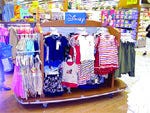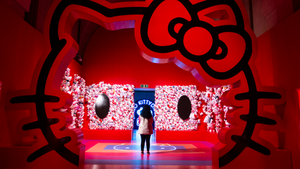Carrefour
]> French retail group Carrefour is the largest hypermarket retailer in Europe. 80% of its take is estimated to be grocery and its fundamental philosophy is to offer its consumers the b
April 6, 2018

]>
French retail group Carrefour is the largest hypermarket retailer in Europe. 80% of its take is estimated to be grocery and its fundamental philosophy is to offer its consumers the best prices. Where does licensing fit into this?

For International Licensing Manager Alexandre Mayaud, licensing is a world Carrefour is just discovering and as far as he is concerned the opportunities are both diverse and promising.
Carrefour's current practise is to offer a wide variety of licensed products in all categories rather than focus on any in particular. The nature of the hypermarket layout means that licensed product is rarely merchandised together, except where individual local stores find it appropriate.
Decisions about which licensed products to stock are made at country buyer level, the buyers relying on a number of sources for direction about what to take: licensees are usually the first point of communication about a new property, but agencies, trade shows and licensors are also important.
The bigger picture, however, is more unusual. In 2002 Carrefour made a deal with Disney to manufacture and distribute infant and children's apparel in all its stores worldwide. The first products went on sale in autumn 2002 and initial indications are of promising sales in all countries. Carrefour will sell between 800,000 and 1,000,000 units of Disney merchandise in a season.
Mayaud explains why Disney was a good choice: 'Disney has international appeal, it's a highly valued, long-lasting licence and with the exception of a few regional adjustments in apparel styling, it was a brand we could offer to all territories.' 
Mayaud believes the direct-to-retail deal is where the future lies. 'I've heard the concerns of small licensees about large retailers doing direct-to-retail deals. But I firmly believe that it's good for large and small companies in the long run. As we have found with the Disney apparel, small licensees find opportunities to create complimentary products and piggy-back the bigger deal.'
In a second example, Carrefour has taken the Cherokee licence for a direct-to-retail deal for apparel for 15-25 year olds, selling into stores in Portugal, Spain and Greece. Cherokee is an extraordinary choice. It has virtually no awareness and no brand equity in mainland Europe. But Carrefour has chosen to present consumers with an existing brand, if hardly known brand rather than an own label product. It has effectively launched the brand in Europe.
Looking ahead, Carrefour sees direct-to-retail deals as more than just making and selling products. 'We can focus on how the products will be distributed and positioned on catalogue pages for example,' says Mayaud. Taking this further, he imagines future opportunities using media events and communications to celebrate the property in store, so long as volumes are at a critical mass.
In all this, it's worth remembering that licensing is not a priority of Carrefour, the central strategy being best prices for the consumer. Nonetheless, Mayaud feels what has been achieved so far is the tip of the iceberg as far as licensing at Carrefour is concerned. 'In Europe we are behind other countries when it comes to licensing. The free market of the USA understands the win-win situation behind licensing. This could be a successful model for Europe. But before we think of launching licensing all over the place we have to think of our consumers' needs. It's still not the done thing in France to wear a licensed character t-shirt like it is in the US.'
History
The Carrefour Group was founded in 1959 and the first Carrefour hypermarket was opened in Sainte-Genevieve-des-Bois (near Paris) in 1962. A series of acquisitions between 1988 and 1998 culminated in the Carrefour-Promodes merger and 1998 saw the first worldwide promotional efforts. In 2000, the group launched the carrefour.fr website and opened its first hypermarket in Japan.
Carrefour is rapidly expanding three of its business lines abroad: hypermarkets, supermarkets and hard discount stores. Its strategy consists of building market share in each country by expanding the type of retailing best suited to the local market and by taking advantage of the way the three formats complement one another.
About Carrefour hypermarkets
Carrefour is the international hypermarket brand of the Carrefour Group. It has 730 stores in 30 countries.
One new Carrefour hypermarket is opened somewhere in the world every week.
Carrefour Group is the biggest retailer in Europe and the 2nd largest retailer worldwide. It has more than 9,200 stores in 30 countries in three formats: hypermarket, supermarket and hard discount.
Hypermarkets account for 60% of group sales which stand at ‚78 bn
Carrefour hypermarkets stock an average of 70,000 items. The focus is on providing consumers with a wide range of choices in food, personal care, culture and communication, leisure and entertainment, and household goods, all at attractive prices. The hypermarkets also offer services, such as insurance, financial services, travel, car service, eye care, florists, tickets sales, etc.
Floor areas of hypermarkets range from 5,000 m2 to over 20,000 m2 and their catchment areas are very large.
Carrefour boasts environmental initiatives such as targets for the reduction of packaging, recyclability and a policy to buy locally in every country, reducing the length of supply chains and minimizing environmental impact. It recycled 110,000 tonnes of cardboard in 2000.
Products in the 'Carrefour Quality Lines' are 100% traceable to their supplier, guaranteeing customer safely and 'protecting the flavour, savoir-faire and authenticity by finding the best-adapted land, the best producer and the best working conditions.'
Carrefour's retail brands include Champion, Dia, 8 ýuit and Shopi. Carrefour has had its own clothing label since 1982 called Tex, offering household linens, infants' and children's clothing and accessories, and contemporary lines of men's and women's clothing.
You May Also Like






